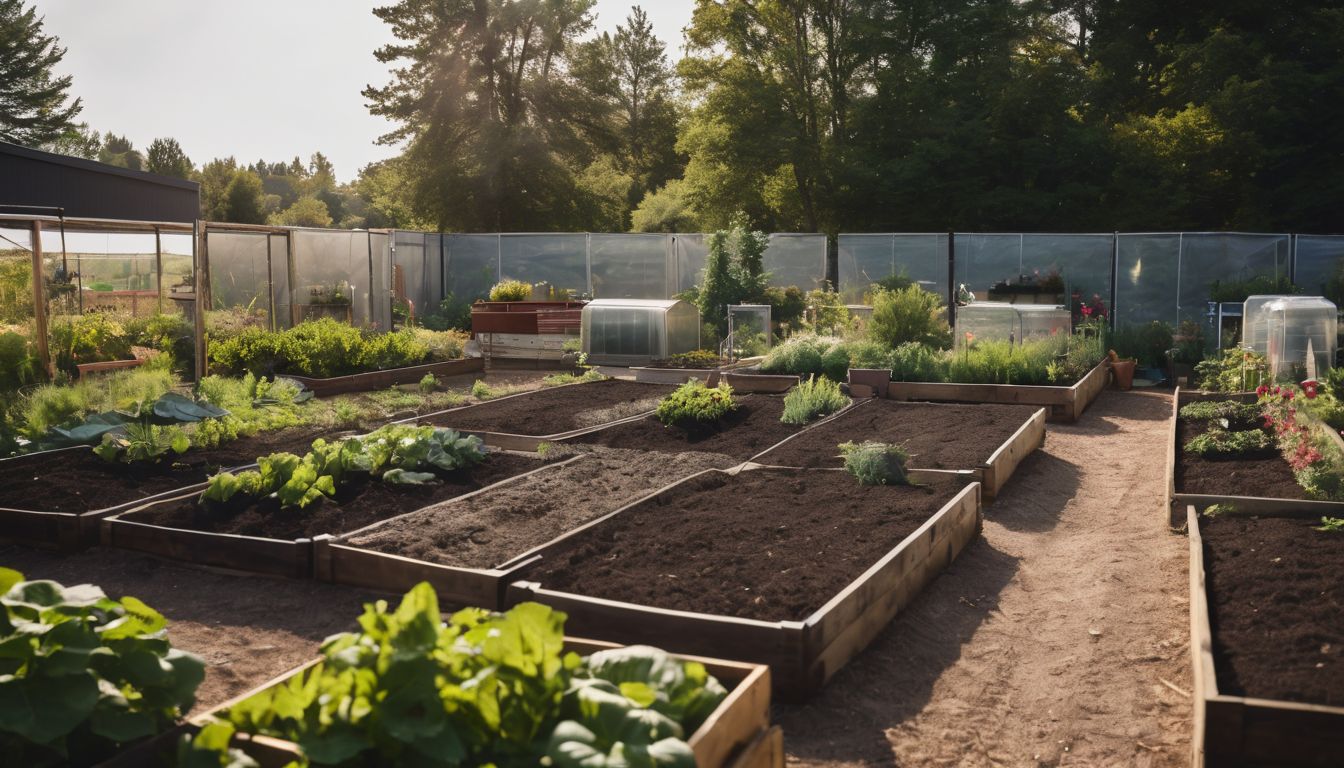Community gatherings are the heart and soul of our local spirit, yet seeing the aftermath with bins brimming over with single-use plastics can really pull on our heartstrings. It’s a sight all too common, and if you’re anything like us, you’ll understand that twinge of guilt for Mother Earth.
Figures suggest that in the UK alone, our bustling outdoor events contribute around 23,500 tonnes of waste each year. With this in mind, we’ve brewed up a guide to eco-conscious event planning – because it truly is possible to fuse fun with sustainability.
Let’s embark on this green voyage together!
Key Takeaways
- Sustainable event planning can drastically cut down waste and emissions. The UK event industry generates 100,000 tonnes of trash yearly, with only 15% being recycled. By choosing eco-friendly venues, suppliers, and green transport, community events can lead the way in environmental conservation.
- Reducing paper and plastic use is key for eco – friendly events. Digital invitations save trees while compostable serveware minimises landfill contributions. Establishing a waste management program with recycling stations helps sort out recyclables from general waste effectively.
- Collaboration boosts sustainability efforts at events—sharing ideas with other planners cultivates innovation in green practices. Encouraging local sourcing for catering and décor supports regional economies and lessens carbon footprints thanks to shorter supply chains.
- Get everyone on board by communicating clearly about ecological goals to partners and volunteers; their involvement is crucial for success. With shared commitment, it’s easier to make an impact through collective action like cycling instead of driving or repurposing materials creatively for décor.
- Eco – friendly choices don’t stop at food or decoration—the entire event infrastructure needs a sustainable approach too! From promoting electric cars to considering the lifecycle impact of products used during the gathering, every decision counts towards a greener future for our communities.
Importance of Sustainable Event Planning
Sustainable event planning is crucial for reducing the environmental impact of events, saving costs, and promoting a positive social reputation. Statistics show that the event industry produces a significant amount of waste, making it essential to prioritise sustainability in event planning.
Environmental, economic, and social benefits
We see a ripple effect of positive change when we organise eco-friendly events. These gatherings protect ecosystems by reducing waste and conserving resources, which in turn preserves natural habitats and promotes biodiversity.
Embracing green venues reduces the environmental impact of our activities while showcasing sustainable living practices. Our eco-conscious efforts directly contribute to cleaner air and water, ensuring a healthier planet for all species.
Hosting green events also sparks economic growth within our communities. We support local businesses by choosing organic catering from nearby suppliers and upcycling materials for event decor.
This approach not only creates jobs but encourages industries to adopt more environmentally responsible practices. Socially, these events bring people together around shared values, fostering community engagement, raising environmental awareness, and inspiring collective action towards conservation and sustainability goals.
Statistics on event industry waste
As we consider the myriad benefits of sustainable event planning, it’s crucial to examine the data on event industry waste, which underscores the need for eco-friendly practices. Here’s a snapshot of key statistics:
| Statistic | Detail |
|---|---|
| Annual Waste Generated | The UK event industry alone produces an estimated 100,000 tonnes of waste each year. |
| Waste to Landfill | Approximately 50% of event waste goes directly to landfill. |
| Recycling Rate | Events typically achieve a recycling rate of just 15%, far below the potential. |
| Carbon Footprint | A sizeable event can produce upwards of 5,000 kg of CO2 emissions in a single day. |
| Plastic Pollution | Single-use plastics from events significantly contribute to ocean pollution, affecting marine life. |
| Food Waste | Up to 30% of food prepared for events can end up as waste, contributing to economic and environmental losses. |
These figures illustrate the impact events have on our planet and highlight the imperative for change. Let’s delve into the strategies that can help reduce these alarming numbers.
Strategies for Eco-Friendly Event Planning
Choose a sustainable venue and suppliers, encourage eco-friendly transportation, reduce paper and plastic usage, implement a waste management program, and share successes with other event planners.
These strategies will help in making the event environmentally friendly while reducing its impact on the planet.
Choose a sustainable venue and suppliers
- Select a venue with environmental certifications and green initiatives to reduce carbon footprint.
- Opt for suppliers that offer eco – friendly products and services, such as biodegradable utensils and sustainable decor options.
- Look for locally sourced suppliers to minimise transportation emissions and support the community.
- Prioritise partnerships with businesses that adhere to ethical and environmentally responsible practices.
- Consider the life cycle of products provided by suppliers, choosing those with minimal environmental impact.
- Engage in open communication with both venues and suppliers to express the importance of sustainability goals and seek their input on environmentally conscious solutions.
Encourage eco-friendly transportation
- Promoting walking, cycling, or using public transport as the preferred modes of commuting to the event, reducing emissions and traffic congestion.
- Providing a shuttle service for attendees from central locations or public transport hubs to minimise individual car usage.
- Offering incentives such as priority parking or entry for carpoolers and electric vehicle owners to encourage sustainable travel choices.
- Partnering with local transport companies to arrange group discounts for environmentally friendly alternatives like hybrid or electric taxis.
- Creating a dedicated section on the event website with information on public transport options, bike racks, and car-sharing programmes available near the venue.
Reduce paper and plastic usage
When planning an eco-friendly community event, it’s essential to consider the impact of paper and plastic use. Here are some strategies to reduce paper and plastic usage:
- Opt for digital invitations instead of paper ones to minimise waste and save resources.
- Utilise reusable or biodegradable alternatives for serving food and drinks such as compostable plates, cups, and cutlery.
- Encourage attendees to bring their own reusable water bottles or provide water stations instead of single-use plastic bottles.
- Implement a no – straw policy or offer compostable or reusable options if needed.
- Provide recycling bins for paper and plastic waste, ensuring proper waste disposal at the event venue.
Implement waste management program
To complement our efforts in reducing paper and plastic usage, it is essential to implement a waste management programme. This ensures that we handle the waste generated during the event in an environmentally responsible manner. Here are some key strategies to incorporate into our waste management programme:
- Source Separation: Set up designated bins for recycling, composting, and general waste to encourage proper disposal by attendees and vendors.
- Compostable Serveware: Utilise compostable plates, cutlery, and cups to reduce the amount of non-recyclable waste sent to landfills.
- Donation Opportunities: Collaborate with local organisations to collect any leftover food or usable materials after the event for donation or repurposing.
- Waste Auditing: Conduct a post-event waste audit to assess the effectiveness of our waste management strategies and identify areas for improvement.
- Sustainable Packaging: Encourage vendors and sponsors to use sustainable packaging solutions to minimise single-use plastics at the event.
- Educational Signage: Display clear signage throughout the venue to educate attendees about proper waste disposal practices and the importance of recycling.
- Vendor Guidelines: Provide guidelines for vendors on eco-friendly packaging options and best practices for minimising waste generation at their booths.
- Zero-Waste Goals: Aim to achieve zero-waste status by setting ambitious targets for diverting recyclable and compostable materials from landfills.
Share successes with other event planners
Connect with other event planners who share our passion for sustainability. Collaborate on successful eco-friendly initiatives and exchange ideas to elevate the standard for environmentally conscious events.
Engaging in open dialogue fosters innovation, fostering a culture of continuous improvement within the broader community of event planners. By sharing our wins, we can inspire and empower each other to strive toward creating more impactful and sustainable events.
We can benefit from sharing best practices with peers in the industry who understand the importance of reducing environmental impact at events. This collective effort allows us to amplify our positive influence, setting an example that reaches beyond individual events for a more significant, lasting impact on our environment.
Engaging Partners and Volunteers in Eco-Friendly Efforts
Communicate sustainability goals clearly to partners and volunteers, ensuring that everyone understands the importance of eco-friendly efforts. Get their buy-in by explaining the environmental impact assessment and the benefits of going green for the community event.
Communicate sustainability goals
We convey our sustainability goals clearly and effectively to all partners and volunteers. We ensure that everyone involved understands the eco-friendly efforts we are undertaking.
Our communication strategy involves highlighting the benefits of sustainable event management, such as reducing environmental impact and promoting green living. We engage our partners and volunteers by emphasising the importance of carbon neutrality, low-impact practices, and Earth-friendly approaches in planning an eco-friendly community event.
As we communicate our sustainability goals, we also inspire others to adopt similar eco-conscious initiatives when organising events. By sharing our successes with other event planners, we aim to create a ripple effect in the industry towards more sustainable event management.
Get volunteer buy-in
- Engage volunteers early on in the planning process, allowing them to contribute ideas and feel a sense of ownership over the sustainability goals.
- Clearly communicate the environmental impact the event can have and how their contributions can make a difference.
- Provide educational materials or training sessions to inform volunteers about eco-friendly practices and inspire their commitment.
- Create a positive and inclusive atmosphere that encourages volunteers to actively participate in eco-friendly efforts.
- Recognise and appreciate volunteers for their dedication to sustainable event planning, reinforcing their importance in achieving environmental goals.
Work with eco-conscious event partners
We engage eco-conscious event partners by seeking out businesses and organisations that share our commitment to sustainability. We look for partners who prioritise eco-friendly practices and are willing to collaborate on making the event as environmentally friendly as possible.
- Seek out partners who align with our values, such as local vendors offering sustainable products.
- Collaborate with eco – conscious sponsors and suppliers who can provide recyclable or biodegradable materials.
- Encourage event partners to promote green initiatives in their own marketing efforts, spreading awareness beyond the event itself.
- Share best practices and resources with event partners to foster a culture of sustainability within the community.
- Foster open communication with partners about eco-friendly options, ensuring everyone is on board with the event’s environmental goals.
Making Sustainable Choices During Event Planning
When making sustainable choices during event planning, we prioritise using digital invitations to reduce paper waste and explore upcycling and recycling options for event decor. We also look into local and organic catering choices as well as green transportation options to minimise our environmental impact.
Use of digital invitations
Digital invitations are an excellent way to reduce paper usage for your eco-friendly event. E-vites can be sent via email or through social media platforms, eliminating the need for physical materials and reducing waste.
By using digital invites, you also have the opportunity to track RSVPs electronically, saving time and resources. Additionally, digital invitations allow for easy updates and reminders to be sent out as well as providing a convenient platform for attendees to access event details.
Embracing digital invitations aligns with our sustainability goals by significantly reducing our environmental impact while still effectively communicating event logistics to our guests.
Upcycling and recycling
- Repurpose old decorations and materials, such as turning used bottles into vases or creating art installations from reclaimed materials.
- Set up recycling stations throughout the event space, clearly labelled for different types of recyclables like paper, plastic, and metal.
- Work with local artists to create unique upcycled centrepieces or decor items from salvaged materials.
- Provide reusable tableware and cutlery or use compostable alternatives to reduce single – use plastic waste.
- Encourage attendees to bring their own refillable water bottles and provide water refilling stations to minimise disposable plastic bottle usage.
- Partner with a waste management company that specialises in recycling and upcycling efforts for post-event waste diversion.
Local and organic catering options
- Support local farmers and reduce food miles.
- Promote organic farming practices and avoid harmful chemicals in food production.
- Ensure fresher, higher quality produce for attendees to enjoy.
- Contribute to the local economy and foster community connections through food sourcing.
- Emphasise the importance of sustainable food practices to event attendees, encouraging them to make similar choices in their own lives.
Sustainable event decor
When planning an eco-friendly community event, consider sustainable event decor to minimise environmental impact. Opt for repurposed, recyclable, or biodegradable materials such as reclaimed wood, paper products, and natural fabrics.
- Use repurposed materials for signage, banners, and backdrops to reduce the need for new resources.
- Incorporate potted plants and living centre pieces instead of cut flowers to decrease waste and carbon footprint.
- Choose LED lighting and energy – efficient fixtures to conserve energy during the event.
- Embrace minimalism by using fewer decorations and focusing on natural elements to create an eco – friendly ambiance.
- Collaborate with local artists or artisans to repurpose materials into unique decor items that reflect sustainability values.
- Seek out rental options for event decor to minimise the production of new items and reduce resource consumption.
Green transportation options.
When considering green transportation options, we should prioritise walking, cycling, and the use of public transport. Opting for these modes of transportation reduces carbon emissions and promotes a healthier environment.
Embracing carpooling or ride-sharing can also significantly decrease the number of vehicles on the road during events, reducing traffic congestion and air pollution. Encouraging attendees to utilise these eco-friendly methods of transport aligns with our sustainability goals.
Incorporating electric vehicle (EV) charging stations at the event venue encourages attendees to consider cleaner transportation options. This fosters an environmentally conscious mindset among participants and supports the use of low-emission vehicles.
Conclusion
Implementing sustainable choices during event planning ensures a positive environmental impact. Engaging partners and volunteers in eco-friendly efforts strengthens community involvement.
Making the switch to an eco-friendly event is both achievable and rewarding. Transition towards sustainable practices can make a real difference.
FAQs
1. What does planning an eco-friendly community event involve?
Planning an eco-friendly community event includes selecting a green location and venue, offering locally-sourced food, ensuring the event is plastic-free, and using green catering services.
2. How can I make my community event more environmentally friendly?
To make your community event environmentally friendly, implement sustainable event ideas such as low-impact decorations and activities that promote eco-conscious behaviours among attendees.
3. What are some green catering options for an eco-friendly event?
Green catering for an eco-friendly event often involves serving organic or locally-sourced food items to reduce transportation emissions and waste produced by the gathering.
4. Can choosing an eco-friendly venue really make a difference?
Yes! Selecting an eco-friendly venue supports earth-friendly practices by reducing energy consumption and encouraging guests to engage in environmental efforts during the occasion.
5. Is it difficult to plan a low-impact community gathering?
No, with careful preparation it’s achievable to organise a low-impact gathering by incorporating eco-conscious decisions like opting for digital invitations over paper ones or providing recycling bins throughout the venue.





